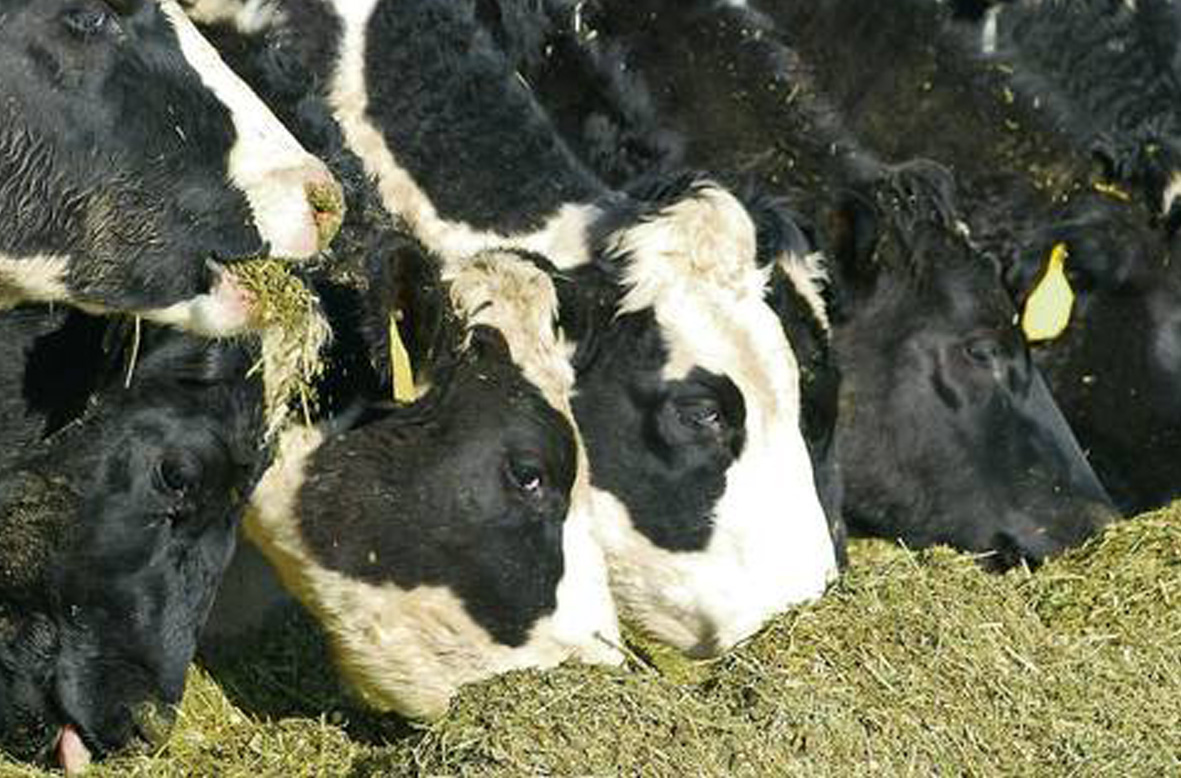Enuring cows are fed minerals and vitamins in the run-up to calving is vital for both cow and calf health. Farmers should consider feeding Minerals at least six weeks pre-calving to combat
deficiencies in the diet. Mineral supplementation plays a vital role in boosting the cow’s immune system, fertility, colostrum production and general health. Deficiencies can lead to serious issues for both cow and calf. For the cow issues include retained foetal membranes, slow calving, calving difficulty and milk fever. A mineral deficiency in the cow in late pregnancy may compromise the calf’s immune system. This may increase susceptibility to scour, pneumonia, navel ill and joint ill.
With grass silage making up a large part of the diet over winter, we rely on the forage itself to provide some of the required minerals. Most silage testing services provide a full silage mineral analysis, aiding correct mineral supplementation.

PHOSPHORUS (P)
Phosphorous is important for energy transfer and deficiencies can lead to infertility. Phosphorous requirements are small (grammes per head per day). Excess Phosphorous may prevent the uptake of calcium, resulting in milk fever.
The recommended level of Phosphorous within a pre-calver mineral supplement is typically 4%. The calcium:phosphorous ratio of the overall diet must also be considered.
MAGNESIUM (Mg)
Magnesium is important for enzyme activation, glucose breakdown and other functions. A deficiency can cause excitability, anorexia, convulsions and salivation. Low magnesium intake interferes with calcium absorption and resorption which increases the risk of milk fever. Magnesium deficiency results in grass staggers (tetany).
CALCIUM (Ca)
Calcium is the most abundant mineral in the body, and generally, there are good levels in forage. However, at the start of lactation calcium requirements are often unable to be met by increasing calcium intake. A lack of calcium in the blood affects the animal’s ability to regulate muscle activity. Milk fever is, all too often, the main result of low calcium levels in the cow’s bloodstream.
Symptoms of milk fever include a lack of muscle co-ordination and twitching, slow calving, dry muzzle, depression, bloat, weak pulse, flaccid muscles and even death. In order to meet calcium demand during lactation, cows must be able to mobilise stored calcium from their bones. To encourage this natural process it is recommended to restrict calcium in the cow’s diet before calving. Magnesium and
potassium can affect the ability of cows to mobilise calcium reserves, so it is important these are correct and balanced in the cow’s diet.
POTASSIUM (K)
Potassium is the third most abundant mineral in the body and is involved in acid-base balance, muscle contraction and nerve function. A deficiency may lead to decreased feed intake, reduced weight gains, poor appetite, and rough hair/coat. Excessive quantities in grass silage can lead to a reduction in magnesium intake, increasing the risk of grass staggers and milk fever. Feeding young/lush grass silage to cows before calving should be avoided as it tends to be high in Potassium.
IODINE (I)
Iodine is a component of the important hormone thyroxine which controls the animals’ energy metabolism. It is also essential for foetal growth and development. Iodine deficiency during pregnancy can cause calves to be born small and weak; an increased incidence of goitre; reduced resistance to hypothermia, decreased survival and low immunity. Cows also tend to retain their afterbirth. Iodine is not stored in the body, which means it must be supplied in the diet. Farmers who have calves born with an enlarged thyroid (goitre) have an iodine deficiency problem and should look to supplement.
We offer two top quality, high specification Minerals which are carefully formulated/designed for feeding to cows (beef & dairy) before calving; ideally for minimum of 6-8 weeks.
PRE-CALVER SUPREME - this is our biggest selling Mineral and many of our dairy farmers achieve significant benefits from feeding it. We continually revise and update the specification of this Mineral each year to ensure that it meets cows requirements based on our own forage test results.
PRE-CALVER ELITE - an even higher specification Mineral which contains a greater level of 'protected' trace elements which are more bioavailable to the cow. Equally this Mineral contains a higher level of Vit E which helps to boost a cow's immune system. Ideally designed for feeding to very high yielding (8,000 - 10,000 litre) dairy cows.
Both of these Minerals are highly palatable powder minerals packed in 25kg bags. The recommended feeding rate is 100 grammes (3.5 ounces) per cow per day, costing just 8 - 10 cents per head !!
Feeding a good quality Pre-calver Mineral is a great ‘insurance policy’ & the dry period is the ideal time to build up the reserves & immune system of an animal that is going to work extremely hard for you throughout 2021.
Article Written by: Bill Reilly, Technical Sales Advisor (Navan/Kells)Tel: 086 061 2901
We stock a complete Mineral range for Dairy, Beef and Sheep. Navan Feed Mill : Call Johnny or Alan on Tel: 046 902 1641
For your local Drummonds Technical Sales Advisors - Click Here.


